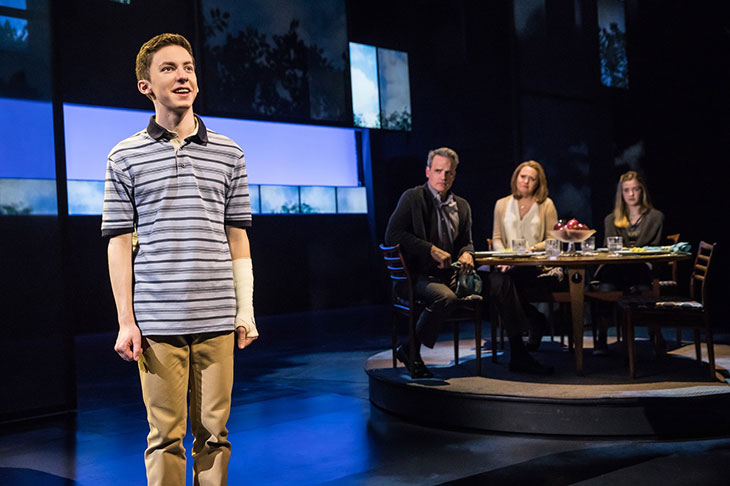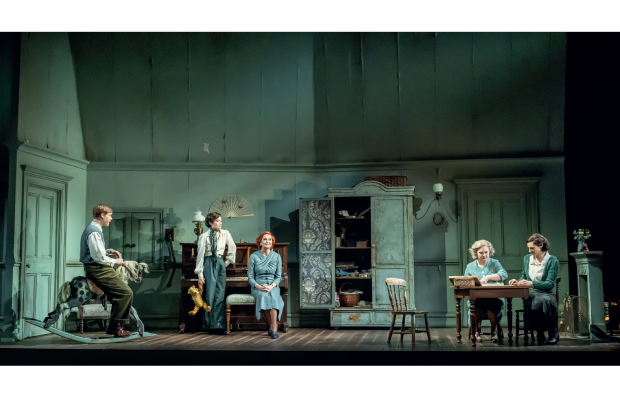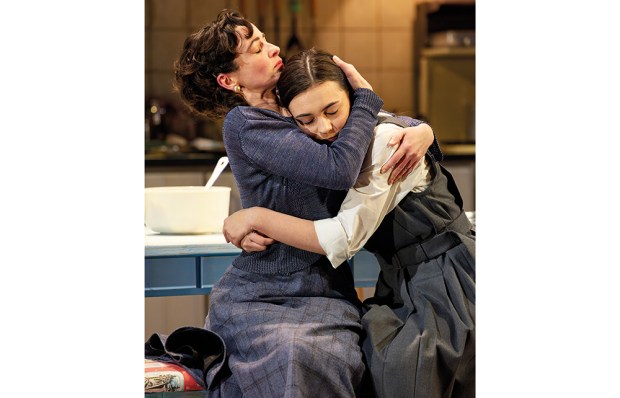Dear Evan Hansen, by Steven Levenson, opens as a standard American teen-angst musical. Evan is a sweaty geek with a crush on Zoe Murphy whose rebellious brother, Connor, is so disturbed that he styles his hair to suggest ‘school-shooter chic’. Evan tries to befriend Connor but gets shoved to the ground. Then, a bombshell. Connor kills himself. By an amazing but credible coincidence Connor’s parents start to believe that Evan was good pals with their deceased son. And Evan exaggerates the depth of the friendship in order to help the family, and especially the mother, cope with their grief. He even fabricates an exchange of emails in which Connor appears to speak warmly about his parents and to express hopes for the future. Evan’s ulterior motive is to get closer to Zoe.
The plan works. He becomes a regular at the Murphys’ dinner table. Meanwhile a cult of Connor springs up at school. Evan’s lies spread goodness in all directions. A misfit teenage girl makes herself popular by running the Connor fan club. Another boy cashes in by flogging commemorative bracelets and keepsakes. Evan himself overcomes a stammer and delivers a dazzling eulogy to Connor in front of the entire school. The script at this point is a marvellous synthesis of parable, satire and romantic comedy.
The songs are hummable and the lyrics are smart and witty. But a dreadful shadow hangs over the tale. Evan is a fraud. By the end of Act One his transformation from bullied nonentity to rising star is complete. The Connors treat him like a family favourite and he roams the playground arm in arm with the adorable Zoe. The pair look set to become the coolest couple in town. But how can Evan extricate himself from the cruel and monstrous lies he has created? The answer, when it comes, is so moving and unexpected that even the most hardened cynic is likely to sigh with forgiveness and understanding.
This fantastic show is selling out fast and rightly so. Lovers of artful plotting will adore the intricacies of the narrative. Every little detail counts. At the start, Evan has a fractured wrist caused by a fall from a tree. His classmates tease him about it. ‘The only person ever to break his arm masturbating.’ But the truth behind this accident throws additional light on the lad’s weird decision to turn a classmate’s suicide into a huge psychodrama. The show’s final moments are a little too schmaltzy and generic with the characters urging us to cherish goodness and the power of love, and so on. That aside, this is an astonishing treat which deserves to stick around for yonks. It probably will.
Mary Shelley’s Frankenstein is an updated version of the groundbreaking tale about a scientist brought low by his most daring experiment. Rona Munro’s adaptation blends modernity with history. The home of the Frankenstein family looks like an advertising agency in Oslo with bare white walls and bleached tree branches thrusting up from the floorboards. A mezzanine with a see-through balustrade overlooks the minimalist sitting room. The same duality applies to the script, which is introduced by Mary Shelley herself standing at a lectern and complaining about writer’s block. Inspiration strikes her and she hastily scribbles out the next chapter of her masterpiece.
As the tale proceeds she observes it from a distance but sometimes she participates in the action as well. This metatextual ambivalence becomes tiresome because it simply doesn’t work in a play. Is she part of the story or not? The answer can’t be ‘both’. The script sticks closely to the original and some of the dialogue feels overly blunt and declarative. ‘Discover knowledge and change the world,’ orders Victor Frankenstein’s father.
The young genius has already begun experimenting with electricity and necromancy. His family are getting worried. ‘Every day,’ he soothes them, ‘natural scientists discover something stranger than raising demons.’ Soon he’s fiddling with body parts and electric wires and suddenly — BANG — the Monster comes to life at the rear of the stage. He looks like a strapping high-protein type, all bulging pecs and tufty chest hair. Capering across the stage, he rants about how miserable he is. Perhaps this Monster might make a larger effort to ensnare our sympathy. All he wants, he mopes, is to be happy. But if he can’t manage that he’ll settle for being a pain in the neck. He starts bumping off members of Victor’s family — mainly, it seems, to lighten his mood. The best that can be said for this energetic but rather earnest show is that it’s a useful primer for those unfamiliar with the book.
At press night, the stalls were occupied by a group of 50 teenage boys who made quite a din before curtain-up. But they watched in (almost) perfect silence. They must have been gripped.
Got something to add? Join the discussion and comment below.
Get 10 issues for just $10
Subscribe to The Spectator Australia today for the next 10 magazine issues, plus full online access, for just $10.
You might disagree with half of it, but you’ll enjoy reading all of it. Try your first month for free, then just $2 a week for the remainder of your first year.














Comments
Don't miss out
Join the conversation with other Spectator Australia readers. Subscribe to leave a comment.
SUBSCRIBEAlready a subscriber? Log in